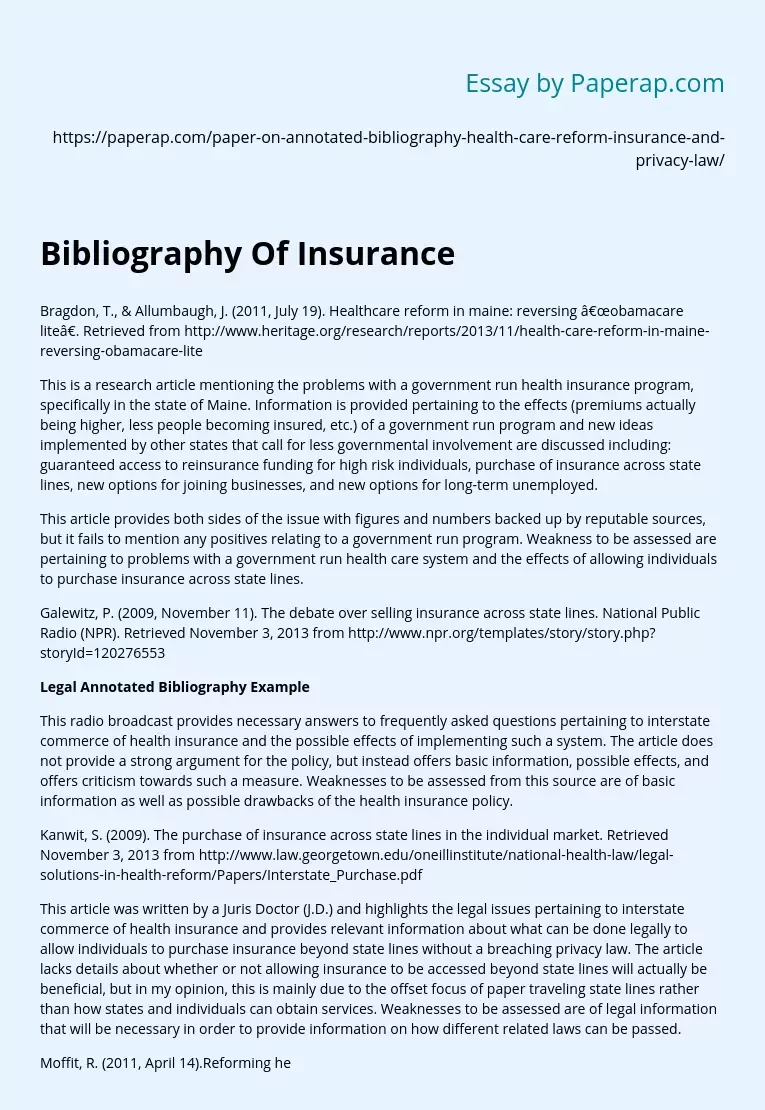Bibliography Of Insurance
Bragdon, T., & Allumbaugh, J. (2011, July 19). Healthcare reform in maine: reversing “obamacare lite”. Retrieved from http://www.heritage.org/research/reports/2013/11/health-care-reform-in-maine-reversing-obamacare-lite
This is a research article mentioning the problems with a government run health insurance program, specifically in the state of Maine. Information is provided pertaining to the effects (premiums actually being higher, less people becoming insured, etc.) of a government run program and new ideas implemented by other states that call for less governmental involvement are discussed including: guaranteed access to reinsurance funding for high risk individuals, purchase of insurance across state lines, new options for joining businesses, and new options for long-term unemployed.
This article provides both sides of the issue with figures and numbers backed up by reputable sources, but it fails to mention any positives relating to a government run program. Weakness to be assessed are pertaining to problems with a government run health care system and the effects of allowing individuals to purchase insurance across state lines.
Galewitz, P. (2009, November 11). The debate over selling insurance across state lines. National Public Radio (NPR). Retrieved November 3, 2013 from http://www.npr.org/templates/story/story.php?storyId=120276553
Legal Annotated Bibliography Example
This radio broadcast provides necessary answers to frequently asked questions pertaining to interstate commerce of health insurance and the possible effects of implementing such a system. The article does not provide a strong argument for the policy, but instead offers basic information, possible effects, and offers criticism towards such a measure. Weaknesses to be assessed from this source are of basic information as well as possible drawbacks of the health insurance policy.
Kanwit, S. (2009). The purchase of insurance across state lines in the individual market. Retrieved November 3, 2013 from http://www.law.georgetown.edu/oneillinstitute/national-health-law/legal-solutions-in-health-reform/Papers/Interstate_Purchase.pdf
This article was written by a Juris Doctor (J.D.) and highlights the legal issues pertaining to interstate commerce of health insurance and provides relevant information about what can be done legally to allow individuals to purchase insurance beyond state lines without a breaching privacy law. The article lacks details about whether or not allowing insurance to be accessed beyond state lines will actually be beneficial, but in my opinion, this is mainly due to the offset focus of paper traveling state lines rather than how states and individuals can obtain services. Weaknesses to be assessed are of legal information that will be necessary in order to provide information on how different related laws can be passed.
Moffit, R. (2011, April 14).Reforming health care on the foundation of first principles. Retrieved from http://www.heritage.org/research/lecture/2013/11/reforming-health-care-on-the-foundation-of-first-principles
Since the argument of this proposal is primarily based off health care policies that are confined to the constitution, this article provides necessary information to support the argument pertaining to the issue of allowing health insurance to be sold/purchased beyond state lines. In addition to mentioning interstate commerce as a possible solution to fixing the health care system, this site mentions other means that can guarantee competition, choice, and possible insurance for all without government involvement, making the system more consumer based and not a bureaucratic enterprise in which consumers are forced to fund health care for others, even in possible situations where the taxpayer does not agree with how the money is being spent.
This is a research article provided by the heritage foundation and although written by an individual, it is written in the section health care and political thought; therefore, it is based off a mix of opinion supported with reputable sources. In my opinion, the article provides thorough knowledge of the reform without the extensive research of scholars and interviews. The author’s strength is provided in precise information on how the new reform policy undermines the Constitution of the United States, and how fixing the current system with a free market approach is much more suitable for the U.S.
Moran, M., Holloman, S., Kassler, W., & Dozier, B. (2004). Living with the HIPAA privacy rule. Journal of law, medicine, and ethics, 32(4), 73-76. Retrieved from http://web.ebscohost.com.library.capella.edu/ehost/detail?sid=2ff41f62-d29a-481b-a03f-44b6e17f02a6%40sessionmgr198&vid=1&hid=112&bdata=JnNpdGU9ZWhvc3QtbGl2ZSZzY29wZT1zaXRl#db=aph&AN=17721174
This article is a brief overview of opinionated research conducted by four educated speakers and authors on the knowledge of privacy law under the HIPAA act. This article also takes an in-depth approach into privacy requirements of the HIPAA’s contingent role with the OCR and enforcement of law for patient privacy accusations and violators. I believe that this article is a strong source in relation to healthcare privacy laws because of its detailed research approach. I believe that each speaker displayed a thorough knowledge of the topic but lacked in situational illustration to be assessed.
Bibliography Of Insurance. (2019, Dec 05). Retrieved from https://paperap.com/paper-on-annotated-bibliography-health-care-reform-insurance-and-privacy-law/

